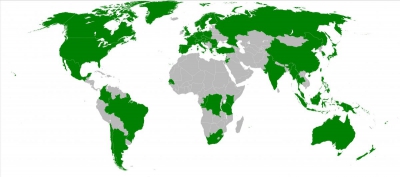Amchitka (; Aleut: Amchixtax; Russian: ) is a volcanic, tectonically unstable and uninhabited
island in the Rat Islands group of the Aleutian Islands in southwest Alaska. It is part of the Alaska Maritime National Wildlife Refuge. The island, with a land area of roughly 116 square miles (300 km2), is about 42 miles (68 km) long and 1 to 4 miles (1.6 to 6.4 km) wide. The area has a maritime climate, with many storms, and mostly overcast skies.
Amchitka was populated for more than 2,500 years by the Aleut people, but has had no permanent population since 1832. The island has been part of the United States since the Alaska Purchase of 1867. During World War II, it was used as an airfield by US forces in the Aleutian Islands Campaign.
Amchitka was selected by the United States Atomic Energy Commission to be the site for underground detonations of nuclear weapons. Three such tests were carried out: Long Shot, an 80-kiloton (330 TJ) blast in 1965; Milrow, a 1-megaton (4.2 PJ) blast in 1969; and Cannikin in 1971 at 5 Mt (21 PJ), the largest underground test ever conducted by the United States. The tests were highly controversial, with environmental groups fearing that the Cannikin explosion, in particular, would cause severe earthquakes and tsunamis. Amchitka is no longer used for nuclear testing. It is still monitored for the leakage of radioactive materials.
Greenpeace is an independent global campaigning network. The network comprises 26 independent national/regional organisations in over 55 countries across Europe, the Americas, Africa, Asia and the Pacific, as well as a co-ordinating body, Greenpeace International, based in Amsterdam, the Netherlands. Greenpeace was founded in 1971 by Irving and Dorothy Stowe, immigrant environmental activists from Canada and the United States. Greenpeace states its goal is to "ensure the ability of the Earth to nurture life in all its diversity" and focuses its campaigning on worldwide issues such as climate change, deforestation, overfishing, commercial whaling, genetic engineering, and anti-nuclear issues. It uses direct action, lobbying, research, and ecotage to achieve its goals. The global network does not accept funding from governments, corporations, or political parties, relying on three million individual supporters and foundation grants. Greenpeace has a general consultative status with the United Nations Economic and Social Council and is a founding member of the INGO Accountability Charter, an international non-governmental organization that intends to foster accountability and transparency of non-governmental organizations.
Greenpeace is known for its direct actions and has been described as one of the most visible environmental organisations in the world. It has raised environmental issues to public knowledge, and influenced both the private and the public sector. The organization has received criticism; it was the subject of an open letter from more than 100 Nobel laureates urging Greenpeace to end its campaign against genetically modified organisms (GMOs). The organisation's direct actions have sparked legal actions against Greenpeace activists, such as fines and suspended sentences for destroying a test plot of genetically modified wheat and damaging the Nazca Lines, a UN World Heritage site in Peru.
Along with several other NGOs, Greenpeace was the subject of an improper investigation by the US Federal Bureau of Investigation between 2001 and 2005. The Inspector General of the US Justice Department determined that there was "little or no basis" for the investigation and that it resulted in the FBI giving inaccurate and misleading information to the United States Congress.

1971Sep, 15
The first Greenpeace ship sets sail to protest against nuclear testing on Amchitka Island.
Choose Another Date
Events on 1971
- 8Jan
Zulfikar Ali Bhutto
Bowing to international pressure, President of Pakistan Zulfikar Ali Bhutto releases Bengali leader Sheikh Mujibur Rahman from prison, who had been arrested after declaring the independence of Bangladesh. - 7Jun
First Amendment to the United States Constitution
The United States Supreme Court overturns the conviction of Paul Cohen for disturbing the peace, setting the precedent that vulgar writing is protected under the First Amendment to the United States Constitution. - 11Jul
Chile
Copper mines in Chile are nationalized. - 21Sep
Bhutan
Bahrain, Bhutan and Qatar join the United Nations. - 24Nov
D. B. Cooper
During a severe thunderstorm over Washington state, a hijacker calling himself Dan Cooper (aka D. B. Cooper) parachutes from a Northwest Orient Airlines plane with $200,000 in ransom money. He has never been found.

 English
English  español
español  français
français  português
português  русский
русский  العربية
العربية  简体中文
简体中文 